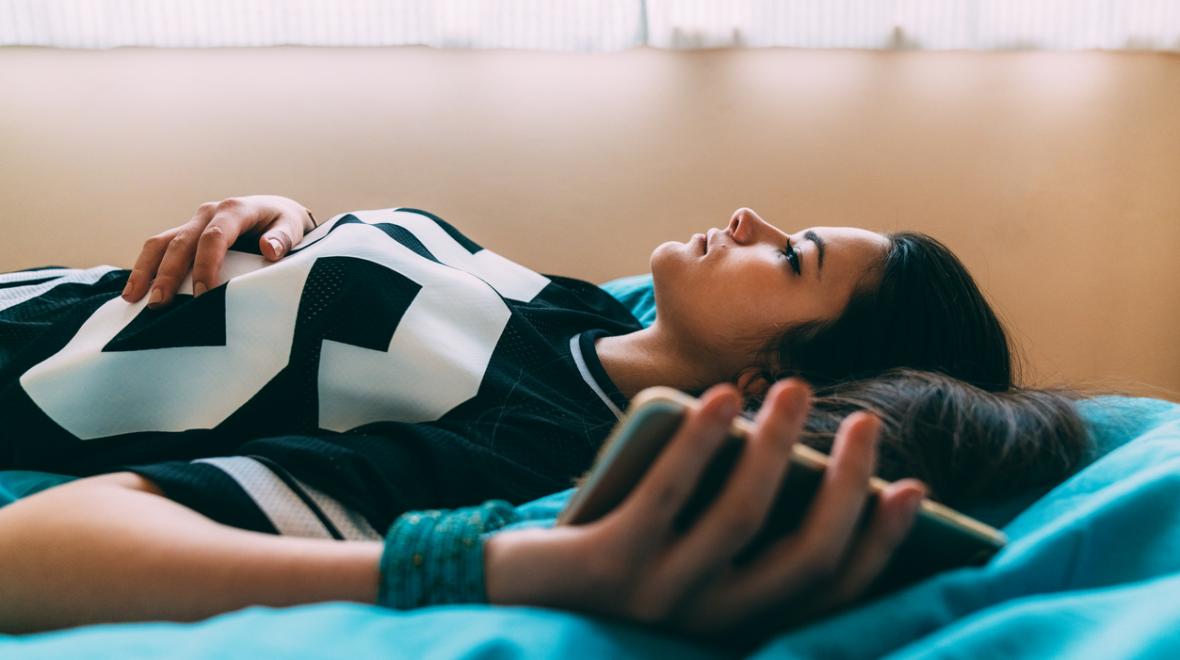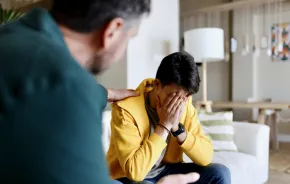
Editor's note: This article was sponsored by THIRA Health.
It’s no secret that our teenagers’ lives have been significantly impacted by the COVID-19 pandemic. Disconnected from their peers due to school closures and canceled activities, many have been struggling to cope, and they’re experiencing new or worsening symptoms of anxiety and depression. Normally, the teenage years are a time when kids become increasingly autonomous, but COVID-19 lockdown and restrictions have kept them confined to their homes, unable to exercise their burgeoning freedom.
What’s more, with any semblance of a regular schedule thrown out the window, teens are experiencing a major uptick in sleep disturbances. Whether they’re sleeping too much or not enough, teens’ changing sleep patterns are having a huge impact on their mental health, experts say. Here’s what parents need to know.
Sleep was a problem for teens even before the pandemic
When it comes to sleep, COVID-19 has taken a heavy toll on teenagers, says THIRA Health Clinical Director Sarah Skoterro, LPCC, LADAC. “We know teens need way more sleep than they usually get. Even pre-COVID, teens were not getting the sleep that they needed. [The pandemic] has exacerbated matters by putting things off center; they don’t have a rhythm to follow during the day. We are creatures of habit, and we do better when our life has some cyclical parts that we can depend on,” says Skoterro.
In a 2021 national poll conducted by C.S. Mott Children’s Hospital, parents were asked about the emotional impact of COVID-19 on their teens. Three out of four parents said the pandemic had a negative impact on their teens’ interpersonal socialization; negative sleep changes were observed in 1 out of 5 teens; and almost half of the parents polled reported a new or worsening mental health concern in their teen (such as anxiety, worry, depression or sadness). All things considered, it’s no wonder teens are feeling frustrated, anxious and disconnected.
While sleep disturbances are on a steady rise in teens, sleep deprivation had become a national epidemic well before COVID-19. Insufficient sleep has serious health implications, putting us at increased risk of obesity, cardiovascular disease and diabetes; reducing our immunity; increasing mental and physical distress; and contributing to anxiety and depression. In teens, who require 8–10 hours of shut-eye each night, sleep plays an important role in brain development and function as well as emotional regulation. Point blank: Sleep keeps us going, and is especially important during times of stress.
Disrupted sleep and isolation compound mental health issues
Zoom classes and online meetings are better than nothing, but teens have really suffered from the loss of human connection, Skoterro says. Social media is a “very abbreviated, capitated experience” compared with interacting face-to-face with another person. “Kids aren’t getting touched. They’re not able to play games. They’re not able to hold hands. They don’t have enough of the physical contact that we know is a health driver. We all need more hugs, and we need more being attended to, but we’re not getting that,” says Skoterro.
This lack of human contact impacts sleep, and it’s a big driver of depression. “We have kids who are sleeping 14 hours a day. They’re just like, ‘Why am I even going to get up? There’s nothing to look forward to.’ They’re seeing it that way, but their bodies are actually saying, ‘I don’t have a drive to get up, because I’m not interacting with anybody in a meaningful way.’ Either [they’re sleeping too much] or they have really, really abbreviated sleep because they’re anxious. Both extremes throw our bodies and our brains out of balance,” says Skoterro. Because their sleep is deprived or hijacked, kids don’t have the emotional or neurobiological bandwidth to carry on as usual; since last summer, there’s been a resulting marked increase in depression, suicidal ideation and suicide.
Whether they’re oversleeping or not banking enough z’s, sleeping during odd hours of the day throws teens’ circadian rhythm out of whack. Our body’s circadian rhythm, or natural sleep-wake cycle, is affected by external environmental cues. In teens who are napping during the day and then staying up half the night, a disrupted circadian rhythm has serious physical and psychological consequences.
Help your teen get their sleep back on track
By going to bed around the same time each day and waking up at the same time each morning, we retrain our biological system to get back into its groove, says Skoterro. She recommends teens (or really, all of us) spend an hour or two outdoors every day to help get the body’s circadian rhythm back on track.
At least an hour before bedtime, teach the brain it’s time to simmer down by turning off electronics, getting changed into pajamas and turning lights down to low levels. Doing this “tells our whole system it’s time to go to sleep,” says Skoterro. Teens should have a regular time that they’re going to bed (maybe it's 10:30–11:00), and a regular waking time (perhaps between 8–8:30), she says. Electronics should be turned off, or even better, kept outside of the room.
It can be tough to enforce a bedtime in independent teens who are fast approaching adulthood. Still, it is possible for parents to promote healthy sleep habits in their teens without encroaching on their freedom; just make it a team effort by modeling good sleep hygiene yourself (you know the drill).
If your teen is really resistant to getting their sleep routine back on track, have a heart-to-heart talk. “Start with the approach of how much you love them, and then say, ‘I’ll do it, too.’ It starts with love. I love you, I want the best for you, and I respect you — and I know that this will help you,” says Skoterro. Be sure you’re settled down instead of “sitting up listening to Jimmy Kimmel and rabble-rousing until midnight while your kids have to go to bed,” she says.
We owe it to our teens to support them and their mental health in every way possible, during what may very well be the most difficult time of their lives. When we make good sleep hygiene a family affair, it’s all the more successful.
|
Sponsored by: |

|











